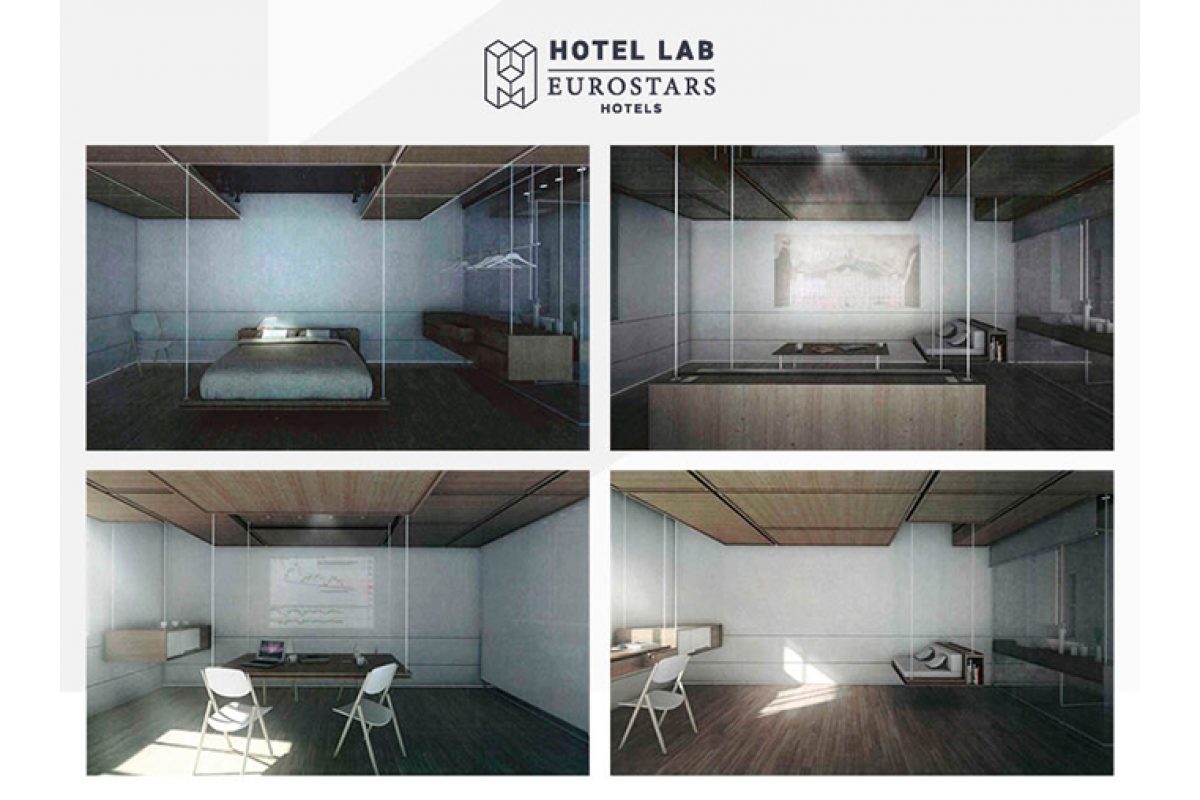The III edition of the Eurostars Hotel Lab Contest reveals what the hotel rooms of the future will look like

Eurostars Hotels closes the third edition of the Innovation and Design for Hotel Spaces Competition, Eurostars Hotel Lab, with 176 projects focused on the redesign of a hotel room
The No-Room project by Muga Arquitectos studio located in Bilbao has won the third edition of the Innovation and Design for Hotel Spaces Competition, Eurostars Hotel Lab.
The project by the studio from Bilbao, which will receive €8,000, has been awarded the first prize for its innovative proposal that includes motorised furniture that are suspended from the ceiling in such a way that guests can furnish the space according to their needs throughout the day using a phone app, thus designing their own personalised habitat.
The jury highlighted the creativity and versatility of the project, which turns away from the standardisation and sameness of conventional hotel rooms to explore the concept of a “temporary home” that's tailored to the needs of guests.

The contest has also included two €1,500 special mentions that have been awarded to the Ingrid project by the architects Mario Abruzzese, Giulia Benedetta and Marta Zanardi from the Milanese studio kick.office;

and to the Wherever space project, by the architects Andrea Distefano and Monica Vitti, from Florence.

This latest edition of Eurostars Hotel Lab was aimed at reflecting on hotel spaces and the need for innovation. That's why the task that was set was to design a hotel room that was equipped with a set of furniture consisting of a bed, wardrobe, luggage rack and workspace. When choosing the winners, the criteria were innovation and creativity, the functionality of the designed elements and the viability to apply the design to the reality of the chain's hotels.
A reflection of current trends
Among the 176 projects submitted to the contest, the jury has found patterns that clearly respond to trends that have been gradually consolidated in the hotel sector regarding interior design and usability. In this sense, the effort to optimise and utilise space in the room to the maximum stands out. This leads us to the tendency to increasingly minimise the area destined to sleep in order to gain more space in the hotel's common areas, such as restoration areas lobbies and co-working spaces. These spaces are also undergoing a transformation, becoming increasingly important as guests tend to spend more time in the hotel, using common areas as a meeting point and a space for socialisation.
Another common aspect is the use of technology to enrich rooms with interactive applications, audiovisual features and connectivity with mobile devices. The implementation of domotic solutions is also present in many projects of the presented projects, aiming at increasing the level of comfort during the guests’ stay.
The desire to adapt the space to the needs of each guest in an effort to personalise their experience also stands out. In order to do so, flexible structures are used, such as panelled walls, multifunctional furniture and perfectly integrated storage solutions. Finally, the number of projects that have equipped the room with multifunctional amenities to cover the new dynamics regarding the use of the room linked to wellness, fitness or mindfulness is remarkable. This is one of the most frequent demands from guests who increasingly opt for more flexible hotel accommodation models.
The three winning projects coincide on these points and are good examples of the current trend to design hotels with guests increasingly as the main focus point. In particular, the winning No-Room project allows guests to have total control over the space, the furniture and the distribution of the elements. In this way, the design takes into account, not only the needs of those who’ll use the hotel just to sleep but also of those people who’ll use the room throughout the day.
Reinvent hotel spaces
With this contest, aimed at both students and professionals in the fields of design, architecture and interior design, Eurostars Hotels is once again committed to reflecting on hotel spaces in order to adapt them to the uses and needs of 21st-century travellers. The event is an initiative that the hotel brand launched in 2016 with the aim of creating innovative and creative solutions that provide guests with a personalised experience that is adapted to their lifestyle.
Source: Hotusa Group
News Infurma:
Online Magazine of the International Habitat Portal. Design, Contract, Interior Design, Furniture, Lighting and Decoration
